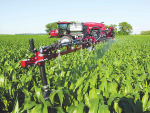Using robots to apply herbicides to kill weeds in vegetable crops would hugely reduce the quantities of chemicals being applied, says a visiting British expert.
Associate professor Alistair Murdoch, of Reading University, UK, says trial work there shows robotic weeding can reduce the amount of chemicals applied by at least 90%.
Murdoch, a specialist in precision agriculture, told a conference at Massey University that the precision of robots allows tasks to be done very accurately. Robotic weeding uses a small robotic vehicle with a chemical tank and a sprayer that applies droplets of chemical to weeds in a crop.
Murdoch says the normal way of controlling crop weeds is by spraying chemicals on an entire field, but with a robot that isn’t necessary.
“To meet new environmental standards, a robot can do a much better job. It can be programmed to, say, get rid of all the weeds – except perhaps one that is of biodiversity value,” he explains.
“We may decide to leave some [weeds] because they may be useful for birds to feed on during the winter. So robotics… may also have environmental applications.”
Robotic weeding confers greater ability to protect from spray drift in non-target areas such as waterways and neighbouring properties, Murdoch says. The robot reduces the danger to humans of applying chemicals and cuts some of the back-breaking work of physically weeding crops.
Traditionally hand weeding was the way of clearing weeds; then came the chemical sprays which are now widely used; this was part of the agrarian revolution.
“I work with developing countries, and see that the most precise farmers are those in the developing countries. They do precision agriculture at a level we are not capable of.
“For example, in Kenya dairy farmers sow densely planted maize. They look at the individual plants and the one that is not going to produce a good cob they pull out and feed it to their animals. That is plant-specific agriculture.”


















